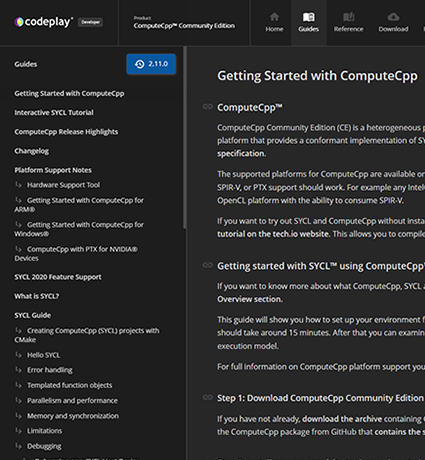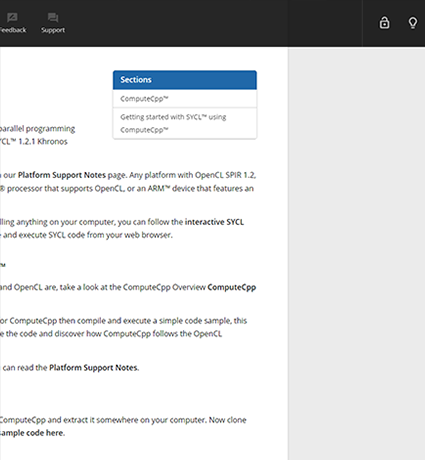This section covers troubleshooting tips and solutions to common issues. If the following doesn’t fix your problem, please submit a support request via Codeplay’s community support website. We cannot provide any guarantees of support, but we will try to help. Please ensure that you are using the most recent stable release of the software before submitting a support request.
Bugs, performance, and feature requests can be reported via the oneAPI DPC++ compiler open-source repository.
Missing Devices in sycl-ls Output
If sycl-ls does not list the expected devices within the system:
Check that there is a compatible version of the CUDA® or ROCm™ SDK installed on the system (for CUDA or HIP plugins respectively), as well as the compatible drivers.
Check that
nvidia-smiorrocm-smican correctly identify the devices.Check that the plugins are correctly loaded. This can be done by setting the environment variable
SYCL_PI_TRACEto1and runningsycl-lsagain. For example:SYCL_PI_TRACE=1 sycl-lsYou should see output similar to the following:
SYCL_PI_TRACE[basic]: Plugin found and successfully loaded: libpi_opencl.so [ PluginVersion: 11.15.1 ] SYCL_PI_TRACE[basic]: Plugin found and successfully loaded: libpi_level_zero.so [ PluginVersion: 11.15.1 ] SYCL_PI_TRACE[basic]: Plugin found and successfully loaded: libpi_cuda.so [ PluginVersion: 11.15.1 ] [ext_oneapi_cuda:gpu:0] NVIDIA CUDA BACKEND, NVIDIA A100-PCIE-40GB 0.0 [CUDA 11.7]If the plugin you’ve installed doesn’t show up in the
sycl-lsoutput, you can run it again withSYCL_PI_TRACEthis time set to-1to see more details of the error:SYCL_PI_TRACE=-1 sycl-lsWithin the output, which can be quite large, you may see errors like the following:
SYCL_PI_TRACE[-1]: dlopen(/opt/intel/oneapi/compiler/2023.2.1/linux/lib/libpi_hip.so) failed with <libamdhip64.so.4: cannot open shared object file: No such file or directory> SYCL_PI_TRACE[all]: Check if plugin is present. Failed to load plugin: libpi_hip.so
The CUDA plugin requires
libcuda.soandlibcupti.sofrom the CUDA SDK.The HIP plugin requires
libamdhip64.sofrom ROCm.
Double-check your CUDA or ROCm installation and make sure that the environment is set up properly i.e.
LD_LIBRARY_PATHpoints to the correct locations to find the above libraries.Check that there isn’t any device filtering environment variable set such as
ONEAPI_DEVICE_SELECTOR(note thatsycl-lswill warn if this one is set), orSYCL_DEVICE_ALLOWLIST.Check permissions. On POSIX access to accelerator devices is typically gated on being a member of the proper groups. For example, on Ubuntu Linux GPU access may require membership of the
videoandrendergroups, but this can vary depending on your configuration.
Dealing with Invalid Binary Errors
When running SYCL™ applications targeting CUDA or HIP, under certain
circumstances the application may fail and report an error about an
invalid binary. For example, for CUDA it may report
CUDA_ERROR_NO_BINARY_FOR_GPU.
This means that the SYCL device selected was provided with a binary for the incorrect architecture. In that scenario, check the following points:
Make sure your target is in -fsycl-targets and that the correct architecture matching the available hardware is specified with the flags:
Flags for CUDA:
-Xsycl-target-backend=nvptx64-nvidia-cuda --cuda-gpu-arch=<arch>Flags for HIP:
-Xsycl-target-backend=amdgcn-amd-amdhsa --offload-arch=<arch>
Ensure that the correct SYCL device (matching the architecture that the application was built for) is selected at run-time. The environment variable
SYCL_PI_TRACE=1can be used to display more information on which device was selected, for example:SYCL_PI_TRACE[basic]: Plugin found and successfully loaded: libpi_opencl.so [ PluginVersion: 11.16.1 ] SYCL_PI_TRACE[basic]: Plugin found and successfully loaded: libpi_level_zero.so [ PluginVersion: 11.16.1 ] SYCL_PI_TRACE[basic]: Plugin found and successfully loaded: libpi_cuda.so [ PluginVersion: 11.16.1 ] SYCL_PI_TRACE[all]: Requested device_type: info::device_type::automatic SYCL_PI_TRACE[all]: Requested device_type: info::device_type::automatic SYCL_PI_TRACE[all]: Selected device: -> final score = 1500 SYCL_PI_TRACE[all]: platform: NVIDIA CUDA BACKEND SYCL_PI_TRACE[all]: device: NVIDIA GeForce GTX 1050 TiIf an incorrect device is selected, the environment variable
ONEAPI_DEVICE_SELECTORmay be used to help the SYCL device selector pick the correct one - see the Environment Variables section of the Intel® oneAPI DPC++/C++ Compiler documentation.
Code execution hangs
Execution of code will hang for CUDA backend when group algorithms use double precision floating point numbers and:
broadcastjoint_exclusive_scanjoint_inclusive_scanexclusive_scan_over_groupinclusive_scan_over_group
are compiled with the icpx compiler. If you wish to use Group Algorithms
then the DPC++ clang++ compiler driver must be used.
Opaque pointers are only supported in ‘-opaque-pointers’ mode
In some cases when building for spir and nvidia or amd targets the compiler will fail with an error as follows:
clang-offload-bundler: error: Opaque pointers are only supported in -opaque-pointers mode (Producer: 'Intel.oneAPI.DPCPP.Compiler_2023.2.0' Reader: 'Intel.oneAPI.DPCPP.Compiler_2023.2.0')
The workaround for this issue is usually to swap the order of the targets in the
-fsycl-targets option.
For example the following command will fail:
$ icpx -fsycl -fsycl-targets=spir64,nvptx64-nvidia-cuda test.cpp -c -o test.o
clang-offload-bundler: error: Opaque pointers are only supported in -opaque-pointers mode (Producer: 'Intel.oneAPI.DPCPP.Compiler_2023.2.0' Reader: 'Intel.oneAPI.DPCPP.Compiler_2023.2.0')
icpx: error: clang-offload-bundler command failed with exit code 1 (use -v to see invocation)
But the following command will succeed:
$ icpx -fsycl -fsycl-targets=nvptx64-nvidia-cuda,spir64 test.cpp -c -o test.o
This is a bug in the compiler due to the fact that Nvidia and AMD targets have switched to opaque pointers but spir targets haven’t switched yet. This will be fixed in future versions of the compiler.
Unresolved extern function ‘…’ / Undefined external symbol ‘…’
This may be caused by a number of things.
There is currently no support for
std::complexin DPC++. Please usesycl::complexinstead.
Some C++ standard library math functionality declared in <cmath> (such as
std::cos,logf, sinf``) is not supported in kernel code for the AMDGPU backend of DPC++. Please use the equivalentsyclnamespaced versions instead.See Install oneAPI for AMD GPUs (beta) for more information.


